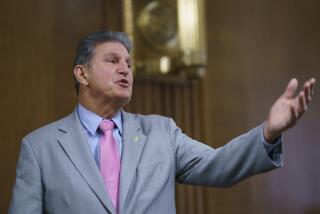Simplistic Deficit Cure Would Change Society
Feb. 6, 1986. Executive Office of the President, MAJOR POLICY INITIATIVES, fiscal year 1987, PRIVATIZATION.
“The Energy Department operates five power marketing adminstrations (PMAs) which wholesale 6% of all electric power produced in the United States. The President’s budget proposes that the PMAs be sold, achieving a total deficit reduction over the next five years of $12.7 billion.”
Thurow budget proposal: The Transportation Department has financed 42,460 miles of interstate highways (IHs) which constitute 7% of all of the highway mileage in America. The IHs could be sold, achieving a total deficit reduction of $2 trillion.
Fact: If the land, highways, and air rights of the federal interstate highway system were sold for $47 million per mile (a not unreasonable sum given today’s costs of acquiring land, building highways, and being given the right to charge whatever tolls and laws of supply and demand will bear), the sale of the interstate highway system would yield $2 trillion in revenue--a sum large enough to completely retire the entire federal debt and eliminate the effects of all of the deficits incurred under every President from George Washington to Jimmy Carter ($1 trillion) and including the debts incurred under President Reagan (another $1 trillion).
Privately owned highways are not unknown in the rest of the world. The Fiat Motor Corp. owns and collects tolls upon the expressway between Milano and Torino in Italy.
Selling the interstate highways is consistent with the goal of privatization.
Reagan budget: “Over the past 50 years, the federal government has invested in a large electrical power complex that is administered by the power marketing administrations.”
Thurow Proposal: Over the past 30 years, the federal government has invested in a large highway complex that is administered by the Transportation Department.
Reagan budget: “The federal investment in power facilities is intended by law to be repaid to the Treasury. To date however, meaningful repayment has rarely occurred.”
Thurow proposal: The federal investment in interstate highways could be repaid to the Treasury. To date, however, meaningful repayments have never occurred.
Reagan budget: “Inexpensive hydropower allows Bonneville (Power Administration) to subsidize aluminum companies and customers of investor-owned utilities.”
Thurow proposal: “Inexpensive highways allow the Transportation Department to subsidize trucking firms and commuters who use those highways.”
Reagan budget: “OMB (Office of Management and Budget) analysis showed that retail power rates would increase only slightly.”
Thurow proposal: “Analysis shows that the total cost of driving would increase only slightly since only one-fifth of total vehicle miles are driven on interstate highways.
Reagan budget: “It is no longer an appropriate federal responsibility to operate the PMAs. States, localities and private interests are more responsive to customer needs.”
Thurow proposal: It is no longer an appropriate federal responsibility to operate the IHs. States, localities and private interests are more responsive to customer needs.”
Reagan budget: “To implement this proposal, the Administration intends to solicit formal offers.”
Thurow proposal: To implement this proposal, the Administration should solicit formal offers.
Why think small? President Reagan wants to reduce the federal deficit by selling government assets.
Why not eliminate the entire federal debt and cut federal spending by $150 billion per year--the amount that is now spent paying interest on the federal debt? Think big!
Without interest on the national debt, balancing the federal budget could occur with only the most minor of tax increases or cuts in defense and social spending.
Why not? There is a simple answer. If we the American taxpayers sell our national assets to we the American people, we cannot be better off.
The form of ownership has changed but Americans own the same American assets. All we have done is to change the billing address to which we send our checks for covering the costs of running America.
Today, we mail our tax checks to the federal government. Under my proposal, we each would send much smaller checks to the federal government but we would each have to pay about 50 cents per mile when we used the interstate highway system.
Financially we would be neither wealthier nor poorer.
Socially, however, we would be different. A society that charges market fees to enter the national parks (a proposal in the current Reagan budget) is different from a society that pays taxes to support its national parks and then lets everyone enjoy them.
More to Read
Sign up for Essential California
The most important California stories and recommendations in your inbox every morning.
You may occasionally receive promotional content from the Los Angeles Times.










